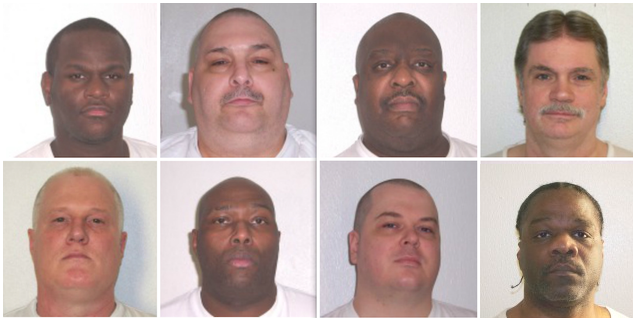The Arkansas Supreme Court on Thursday continued to delay the executions of death-row inmates, so that the prisoners may ask the U.S. Supreme Court to review their challenge of the state's lethal-injection law.
In a 4-3 decision Thursday, the Arkansas justices also declined to rehear the prisoners' arguments that a 2015 law changing the state's method of execution is unconstitutional. On June 23, the court, in an opinion written by Justice Courtney Goodson, upheld the state's execution law. After the decision, the inmates asked the court for a rehearing.
However, in a separate 4-3 ruling Thursday, the court granted a request by the prisoners to stay its mandate, or formal order, on the execution law so they can file a petition with the U.S. Supreme Court.
The court did not issue an opinion explaining its reasoning behind either decision.
The decision on the mandate continues the hold on the executions set last year for eight death-row inmates who challenged changes made to the law in March 2015. Act 1096 of 2015 set the method for executions to include a cocktail of three drugs while also exempting the drugs' manufacturers and suppliers from public-disclosure laws.
A ninth death-row prisoner who has not been set for execution has joined the challenge over the law. Arkansas has not executed an inmate since 2005, in part because of legal challenges over its execution laws and because of problems obtaining the drugs used.
In its June ruling, the Arkansas Supreme Court overturned a circuit judge's finding that the privacy provisions of the law were unconstitutional. That started a waiting period for the court to issue its mandate, during which time the prisoners asked the court to rehear the case or stay its mandate.
Attorney General Leslie Rutledge must wait for that mandate before she can ask the governor to set new execution dates.
The state's supply of one of the three execution drugs -- vecuronium bromide -- expired at the end of June. The Department of Correction announced July 12 that it obtained a new supply of the drug, and Gov. Asa Hutchinson expressed his desire to schedule executions before January, when another of the three drugs expires.
Jeff Rosenzweig, one of the lawyers representing the nine death-row inmates, said he was "disappointed [the justices] denied the request for a rehearing" but was happy with the motion to stay. He said he planned to file a petition to the U.S. Supreme Court within the 90-day deadline.
The U.S. Supreme Court is in its summer recess, though the justices may still review petitions. The court may request a response to the prisoners' petition from the attorney general and does not have to take action on the petition before the next batch of drugs is scheduled to expire.
A spokesman for Rutledge -- who was in Cleveland on Thursday for the Republican National Convention -- said the attorney general is prepared to notify the governor if the U.S. Supreme Court denies the prisoners' petition, exhausting their appeals.
"While she believes any petition to the U.S. Supreme Court will be futile and the Arkansas Supreme Court should have issued the mandate now, the Attorney General is pleased that we are one step closer to obtaining justice for the victims," spokesman Judd Deere said in a statement.
In their motion seeking a stay of the state high court's mandate, attorneys for the prisoners wrote that justices misapplied a previous U.S. Supreme Court decision upholding the use of midazolam, a sedative used in Arkansas' three-drug cocktail.
In Glossip vs. Gross, the U.S. Supreme Court rejected the argument by a group of Oklahoma death-row inmates that the use of midazolam as a sedative in executions amounted to cruel and unusual punishment because it does not completely block pain.
In their motion, the Arkansas prisoners' attorneys indicated they will ask the Supreme Court to clarify a part of its Glossip ruling requiring prisoners to propose an alternative method of execution when challenging the state's method.
Chief Justice Howard Brill joined Goodson and Justices Karen Baker and Rhonda Wood in the decision to deny the prisoners' request for a rehearing. Justices Paul Danielson, Josephine Hart and Robin Wynne dissented.
Brill switched sides in supporting the prisoners' request to stay the mandate, joining Danielson, Hart and Wynne, while Baker, Goodson and Wood were opposed.
There are 34 prisoners on death row in Arkansas, all men.
A Section on 07/22/2016
